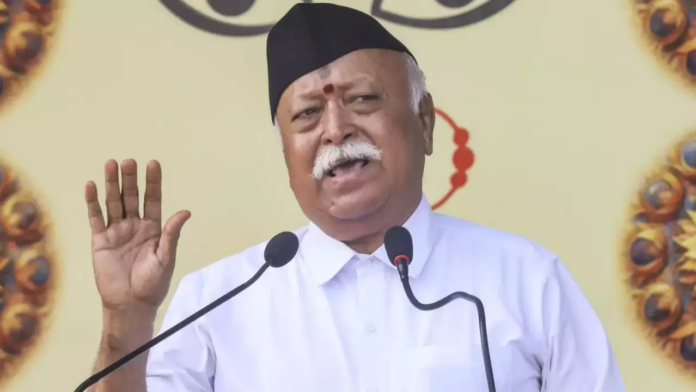Mohan Bhagwat, the chief of Rashtriya Swayamsevak Sangh (RSS), recently stirred controversy by suggesting that had there been no “ghar wapasi” or reconversion of a section of the tribal population, they might have turned “anti-national.” Quoting former President Pranab Mukherjee, Bhagwat’s comments have reignited debates about the historical and present-day narrative around India’s tribal communities.
Colonial Roots Of Tribal Suppression
The controversial term “anti-national” mirrors the colonial mindset that historically marginalized tribal communities. In 1871, the British government enacted the Criminal Tribes Act, branding over 200 tribal communities as “criminal,” including the Kharia tribe. This designation justified the use of oppressive tactics to suppress Adivasi revolts against colonial rule.
Central India, particularly the Chotanagpur region, witnessed significant tribal uprisings during British rule. Leaders like Baba Tilka Majhi, Veer Budhu Bhagat, and Telenga Kharia spearheaded guerrilla warfare against the British. These revolts, such as the Kol Uprising of 1831-32, involved tribes like the Mundas, Oraons, and Kharias, who fiercely resisted the exploitation of their lands and resources.

A Historical Legacy Of Resistance
The struggles of these tribes are deeply embedded in India’s history. Telenga Kharia’s rebellion from 1850 to 1860, for instance, forced families to flee their homes, scattering communities and disrupting their cultural cohesion. Even after the rebellion was suppressed, participants were hunted down, creating a long-lasting impact on tribal societies.
This colonial narrative of labeling tribes as “criminal” has evolved into modern-day stereotypes that view certain communities as inherently problematic or “anti-national.” This perception undermines their historical contributions to India’s freedom struggle and their unique cultural identities.
Jaipal Singh’s Vision For Tribal Communities
During the Constituent Assembly debates, Jaipal Singh, a prominent Adivasi leader, passionately articulated the democratic ethos of India’s tribal communities. Speaking on December 16, 1946, Singh declared, “You cannot teach democracy to the tribal people; you have to learn democratic ways from them. They are the most democratic people on earth.”
Singh’s statement underscores the deep-rooted democratic practices within tribal societies, challenging the notion that these communities need to be “brought back” into a national fold. Instead, they demand recognition and respect for their distinct religious, cultural, and social practices.

The Ghar Wapasi Debate
The concept of “ghar wapasi,” or reconversion to Hinduism, has been a contentious issue in India. Proponents argue that it restores cultural and religious continuity for tribal communities, while critics view it as an imposition that disregards their autonomy and diverse spiritual beliefs.
Tribes across India have been demanding the official recognition of their unique religious practices. Their call for inclusion in the Indian democratic framework as equal stakeholders reflects a broader struggle for rights and representation. Viewing these communities as “anti-national,” regardless of their religious affiliations, is seen as a reductionist approach that ignores their contributions and legitimate demands.
A False Binary Of Nationalism
The dichotomy between “national” and “anti-national” has become a polarizing narrative in contemporary India. This binary overlooks the nuanced realities of communities that do not fit neatly into predefined categories. For example, a tribal mother raising her child to be a contributing citizen or a teacher shaping young minds for the betterment of the country may not be labeled “nationalist,” yet their efforts are undeniably patriotic.
This selective attribution of nationalism raises critical questions about how loyalty to the nation is defined and who gets to decide it. Tribes have their own philosophies and spiritual frameworks, often at par with any other religious or philosophical systems in India or the West. Recognizing and respecting these distinctions is crucial for a truly inclusive democracy.
Demand For Justice And Recognition
The worldview that categorizes tribes as potentially “anti-national” fails to acknowledge their historical oppression and ongoing struggles for justice. The demand for the recognition of tribal religions and rights is not a challenge to Indian democracy but an assertion of their place within it.
Tribal communities have long been at the forefront of India’s environmental and social movements. Their sustainable practices and deep connection to nature offer valuable lessons in ecological balance and community living. Marginalizing these communities based on their religious or cultural choices undermines the principles of pluralism and equality enshrined in the Indian Constitution.
Challenging The Narrative
The debate surrounding Mohan Bhagwat’s statement presents an opportunity to challenge the stereotypes and biases that have historically marginalized India’s tribal communities. It calls for a re-examination of policies and practices that perpetuate exclusion and discrimination.
The journey toward a more inclusive India requires acknowledging the diverse identities that make up the nation. Tribal communities are not “others” to be assimilated but equal participants in shaping the country’s future. Their voices must be heard, their contributions recognized, and their rights upheld.
As India navigates its complex social fabric, embracing diversity and rejecting divisive narratives will be key to building a united and equitable society. Mohan Bhagwat’s comments may have sparked controversy, but they also serve as a reminder of the need for dialogue and understanding in addressing the challenges faced by India’s tribal communities.

